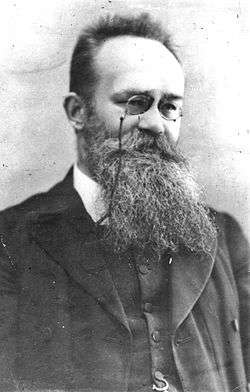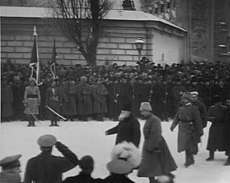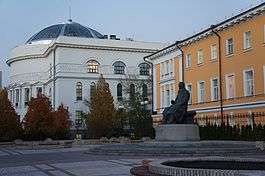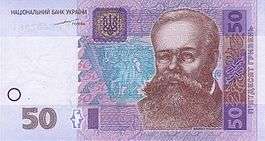Mykhailo Hrushevsky
Mykhailo Serhiyovych Hrushevsky (Ukrainian: Михайло Сергійович Грушевський, Chełm, 29 September [O.S. 17 September] 1866 – Kislovodsk, 24 November 1934), a Ukrainian academician, politician, historian and statesman, was one of the most important figures of the Ukrainian national revival of the early 20th century. He was the country's greatest modern historian, the foremost organiser of scholarship, the leader of the pre-revolution Ukrainian national movement, the head of the Central Rada (Ukraine's 1917–1918 revolutionary parliament), and a leading cultural figure in the Ukrainian SSR during the 1920s.
Mykhailo Hrushevsky Михайло Грушевський | |
|---|---|
 | |
| President of the Central Rada | |
| In office 28 (15) March 1917 [1] – 29 April 1918 | |
| Shevchenko Scientific Society Chairman | |
| In office 1897–1913 | |
| Preceded by | Oleksandr Barvinsky |
| Succeeded by | Stepan Tomashivskyi |
| Personal details | |
| Born | Mykhailo Serhiyovych Hrushevsky 29 September 1866 Kholm, Tsardom of Poland, Russian Empire |
| Died | 24 November 1934 (aged 68) Kislovodsk, North Caucasus Krai, RSFSR, USSR |
| Nationality | Ukrainian |
| Political party | USRP (center) |
| Spouse(s) | Maria-Ivanna Hrushevska |
| Children | Kateryna Hrushevska |
| Alma mater | Saint Volodymyr University, Kyiv |
| Occupation | Academician, historian |
| Academic title | Magister of History |
| Dissertation | "Bar starosta. Historical outline." |
| Magnum opus | History of Ukraine-Rus' |
| Signature | |
Early life

Hrushevsky was born on 29 September 1866 to a Ukrainian noble family in Kholm, Poland, Russia. Hrushevsky grew up in Tiflis, where he attended local school. His spiritual native land became Podillia, in the area of the village of Sestrynivka, Podillia Governorate. There, his mother (Hlafira Zakharivna Okopova) was born, and her father was a local Orthodox priest. In the same village, she married the professor of the Kyiv Ecclesiastical Seminary, Serhiy Fedorovych Hrushevsky, whose father was a highly-decorated official (his awards included the two Orders of Saint Anna and the Bronze Cross, and a title of nobility). Fedir Hrushevsky was graduated from the History Department of the Saint Vladimir Royal University of Kiev and later personally blessed his grandson while he was enrolling to Saint Volodymyr University, in Kyiv.
Historian
Hrushevsky wrote his first academic book, Bar Starostvo: Historical Notes: XV-XVIII, on the history of Bar, Ukraine [2]. As a historian, he authored the first detailed scholarly synthesis of Ukrainian history, his ten-volume History of Ukraine-Rus', which was published in the Ukrainian language and covered the period from prehistory to the 1660s. In the work, he balanced a commitment to the ordinary Ukrainian people with an appreciation for native Ukrainian political entities, autonomous polities, which steadily increased in the final volumes of his master work. In general, his approach combined rationalist enlightenment principles with a romantic commitment to the cause of the nation and positivist methodology to produce a highly-authoritative history of his native land and people. Hrushevsky also wrote a multi-volume History of Ukrainian Literature, an Outline History of the Ukrainian People and a very popular Illustrated History of Ukraine, which appeared in both Ukrainian and Russian editions. In addition, he wrote numerous specialised studies in which he displayed a very acute critical acumen. His personal bibliography has over 2000 separate titles.
In Hrushevsky's varied historical writings, certain basic ideas come to the fore. Firstly, he saw continuity in Ukrainian history from ancient times to his own. Thus, he claimed the ancient Ukrainian steppe cultures from Scythia to Kyivan Rus to the Cossacks as part of Ukrainian heritage. He viewed the Principality of Galicia–Volhynia as the sole legitimate heir of Kievan Rus', which opposed the official scheme of Russian history, which claimed Kievan Rus' for the Vladimir-Suzdal Principality and Imperial Russia. Secondly, to give real depth to the continuity, Hrushevsky stressed the role of the common people, the "popular masses" as he called them, throughout the eras. Thus, popular revolts against the various foreign states that ruled Ukraine were also a major theme. Thirdly, Hrushevsky always emphasised upon native Ukrainian factors rather than international ones as the causes of various phenomena. Thus, he was an anti-Normanist, who stressed the Slavic origins of Rus', internal discord as the primary reason for the fall of Kievan Rus' and the native Ukrainian ethnic makeup and origins of the Ukrainian Cossacks. (He considered runaway serfs especially important in the last regard.) Also, he stressed the national aspect to the Ukrainian Renaissance of the 16th and 17th centuries and considered that the great revolt of Bohdan Khmelnytsky and the Cossacks against the Polish-Lithuanian Commonwealth to be largely a national and social phenomenon, rather than simply a religious phenomenon. Thus, continuity nativism, and populism characterised his general histories.
On the role of statehood in Hrushevsky's historical thought, contemporary scholars still do not agree. Some believe that Hrushevsky retained a populist mistrust of the state throughout his career and that it was reflected by his deep democratic convictions, but others believe that Hrushevsky gradually became more and more for Ukrainian statehood in his various writings and that to be is reflected in his political work on the construction of a Ukrainian national state during the revolution in 1917 and 1918. His political and national activity greatly reduced the credibility of his historical works.
Scholar
As an organiser of scholarship, Hrushevsky oversaw the transformation of the Shevchenko Literary Society, based in province of Halychyna, Austria-Hungary, into a new Shevchenko Scientific Society, which published hundreds of volumes of scholarly literature before the First World War and quickly grew to serve as an unofficial Academy of Sciences for Ukrainian on both sides of the border with Russia. After the Russian Revolution of 1905, Hrushevsky organised the Ukrainian Scientific Society in Kyiv in 1907 that served as a prototype to the future Academy of Sciences. After the 1917-1921 revolution, he founded the Ukrainian Sociological Institute in exile in Vienna. After his return to Ukraine in the 1920s, he became a major figure of the new All-Ukrainian Academy of Sciences in Kyiv in 1923.
Politician
Before 1917
As a political leader, Hrushevsky first became active in Austrian Halychyna, where he spoke out against Polish political predominance and Ruthenian particularism and supported a national Ukrainian identity that would unite both eastern and western parts of the country. In 1899, he was a cofounder of the Galician-based National Democratic Party, which party looked forward to eventual Ukrainian independence. After 1905, Hrushevsky advised the Ukrainian Club in the Russian State Duma, or Parliament.
Ukrainian Revolution

In 1917, Hrushevsky was elected head of the revolutionary parliament, the Ukrainian Central Rada, in Kyiv and gradually guided it from Ukrainian national autonomy within a democratic Russia through to complete independence. He chaired the Congress of the Peoples of Russia. Hrushevsky was then clearly revealed to be a radical democrat and a socialist. On February 17, 1918, The New York Times published an article by Hrushevsky that outlined Ukraine's struggle for self-government.[3] Following the German-supported coup of General Pavlo Skoropadsky, he went into hiding. Hrushevsky felt that Skoropadsky had perverted the cause of Ukrainian statehood by associating it with social conservatism. Hrushevsky returned to public politics after the overthrow of Skoropadsky by the Directory. He did not, however, approve of the Directory and soon found himself in conflict with it. In 1919, he emigrated, having acquired a mandate from the Ukrainian Party of Socialist Revolutionaries to co-ordinate the activities of its representatives abroad.
Emigration and return to Ukraine
While an émigré, Hrushevsky began to become pro-Bolshevik. Along with other members of the Ukrainian Party of Socialist Revolutionaries, he formed the Foreign Delegation of the Ukrainian Party of Socialist Revolutionaries, which advocated reconciliation with the Bolshevik regime. Though the group was critical of the Bolsheviks, especially because if their centralism and repressive activities in Ukraine, it felt that the criticisms had to be put aside because the Bolsheviks were the leaders of the international revolution. Hrushevsky and his group petitioned the Ukrainian SSR government to legalise the Ukrainian Party of Socialist Revolutionaries and to allow the members of the Foreign Delegation to return. The Ukrainian SSR government was unwilling to do so. By 1921, the Foreign Delegation of the Ukrainian Party of Socialist Revolutionaries had ended its activity, but all of its members returned to Ukraine, including Hrushevsky, who did so in 1924.[4]
Later life and death
Back in Ukraine, Hrushevsky concentrated on academic work. Above all, he continued writing his monumental History of Ukraine-Rus'. Although political conditions prevented his return to public politics, he was caught up in the Stalinist purge of the Ukrainian intelligentsia. In 1931, after a long campaign against Hrushevsky in the Soviet press, he was exiled to Moscow. In 1934, under the close watch of the Soviet political police, he died during a routine minor surgery in Kislovodsk, in the Caucasus, at the age of 68.
Legacy
Hrushevsky is presently regarded as Ukraine's greatest 20th-century scholar and one of the most prominent Ukrainian statesmen in Ukraine's history, and he is still famous in Ukraine.[6][7] Hrushevsky has been more lionized than Volodymyr Vynnychenko and Symon Petliura were, despite both playing more important roles during the Ukrainian People's Republic, but both were either too left wing (Vynnychenko) or too associated with violence (Petliura) to make good symbolic figures.[8]

Hrushevsky's portrait appears on the 50 hryvnia note. One museum in Kyiv and another in Lviv are devoted to his memory, and monuments to him have been erected in both cities. A street in Kyiv bears his name houses and the Verkhovna Rada (parliament) and many governmental offices. The Ukrainian Academy of Sciences recently initiated the publication of his Collected Works, in 50 volumes.
Family
Mykhailo Hrushevsky had two siblings: a brother, Oleksandr, and a sister, Hanna.
- Oleksandr Hrushevsky (1877-1943) was married to Olha Hrushevska (Parfenenko) (1876-1961).
- Hanna Shamrayeva had two children, Serhiy and Olha.
His wife, Maria-Ivanna Hrushevska (November 8, 1868 -September 19, 1948), was from 1917 was a member of the Central Rada and a treasurer for the Ukrainian National Theatre.
Bibliography
- Hrushevsky, M., Bar Starostvo: Historical Notes: XV-XVIII, St. Volodymyr University Publishing House, Velyka-Vasyl'kivska, Building no. 29-31, Kyiv, Ukraine, 1894; Lviv, Ukraine, ISBN 5-12-004335-6, pp. 1 – 623, 1996.
References
- March 28 - The meeting of the Ukrainian Central Council, first chaired by Mykhailo Hrushevsky
- Hrushevsky, M., Bar Starostvo: Historical Notes: XV-XVIII, St. Volodymyr University Publishing House, Velyka-Vasyl'kivska, Building no. 29-31, Kyiv, Ukraine, 1894; Lviv, Ukraine, ISBN 5-12-004335-6, pp. 1 – 623, 1996.
- Michaelo, Hrushevsky (17 Feb 1918). "Ukraine's Struggle for Self-Government". The New York Times. Retrieved 16 May 2020.
- Christopher Gilley, ‘The “Change of Signposts” in the Ukrainian emigration: Mykhailo Hrushevskyi and the Foreign Delegation of the Ukrainian Party of Socialist Revolutionaries’, Jahrbücher für Geschichte Osteuropas, Vol. 54, 2006, No. 3, pp. 345-74
- "National bank of Ukraine. Banknotes. 50 UAH. Portrait details". Mar 2017.
- Famous Ukrainians of all times Archived 2014-07-14 at the Wayback Machine, Sociological group "RATING" (2012/05/28)
- Top 11-100 Archived 2013-03-24 at the Wayback Machine, Velyki Ukraïntsi
- Serhy Yekelchyk, Ukraine: Birth of a Modern Nation, Oxford University Press (2007), ISBN 978-0-19-530546-3
Further reading
- Dmytro Doroshenko, "A Survey of Ukrainian Historiography," Annals of the Ukrainian Academy of Arts and Sciences in the US, V-VI, 4 (1957), 262-74.
- Thomas M. Prymak, Mykhailo Hrushevsky: The Politics of National Culture (Toronto: University of Toronto Press, 1987). ISBN 978-0-8020-5737-2.
- Lubomyr R. Wynar, Mykhailo Hrushevsky: Ukrainian-Russian Confrontation in Historiography (Toronto-New York-Munich: Ukrainian Historical Association, 1988).
- Thomas M. Prymak, "Mykhailo Hrushevsky in History and Legend," Ukrainian Quarterly,LX, 3-4 (2004), pp. 216–30. A brief summary of this author's views.
- Serhii Plokhy, Unmaking Imperial Russia: Mykhailo Hrushevsky and the Writing of Ukrainian History (Toronto: University of Toronto Press, 2005). ISBN 978-0-8020-3937-8.
- Pyrig, Ruslan. Mykhailo Grushevsky and the Bolshevik Rule: The Price of Compromises in Zerkalo Nedeli, September 30, 2006. Available in Russian and Ukraine
- Christopher Gilley, The 'Change of Signposts' in the Ukrainian Emigration. A Contribution to the History of Sovietophilism in the 1920s, Ibidem: Stuttgart, 2009, Chapter 4.
External links
- Collection of Hrushevsky's Works at the Canadian Institute of Ukrainian Studies press
- Oleksander Ohloblyn, Lubomyr Wynar. Hrushevsky, Mykhailo in the Encyclopedia of Ukraine, vol. 2 (1989). The bibliography has been updated.
- Yershova, O. Unknown Ukraine: Mykhailo Hrushevsky. Film 86. "Kyivnaukfilm", 1993.
